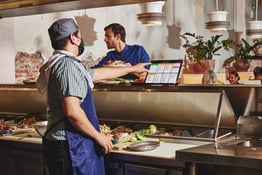In recent years, the restaurant industry has been forced to break out of its technology inertia and start embracing solutions designed to help tighten operations and boost revenue. Given the benefits just mentioned, it’s clear the trend isn’t going anywhere. But that doesn’t mean navigating all of the options is easy.
There are countless technology vendors, selling solutions for everything from managing inventory to creating customer loyalty to hiring and beyond. You're likely fielding at least a few calls from some of these vendors every month. It can be a lot to take in and a lot to navigate. But what better place to start than getting recommendations from your fellow peers?
We reached out to restaurants nationwide to learn operators’ and managers’ favorite technology solutions. Below are some of the top-recommended platforms.
Reservations: Tock
From Tanner Agar, CEO and creative director of Dallas’s Apothecary and Rye:
I’m a huge fan of Tock, our reservation platform. We do quite a number of special pairing dinners and also events, like Valentine’s and New Years Eve dinners. Tock has allowed us to make sure those are ticketed and ensure we don’t get the last-minute cancellations and no-shows that a lot of our colleagues unfortunately get. People in Dallas don’t go out in the rain, and I remember one year it was raining on New Year’s Eve, which is a huge evening where you put together a special menu and do all this work. About 40% of our colleagues’ restaurants were empty, but because our event required nonrefundable tickets, everyone showed up.
Tock has also always been very easy to work with. When you need help, you can immediately call and get a human being to help you. The training tools are also great, and then during COVID, they suspended our payments because we weren’t doing reservations. It very much feels like people who understand restaurants are working there.
Communications: Slack
From Dani Patterson, FOH director for the Georgia restaurant group behind Hampton + Hudson, Pielands, Nina & Rafi, and Standard Service
When we went from a stand-alone store to a multi-unit company, SLACK was a game changer for communication as a team. We went from daily text messages, phone calls, and emails to having one working space that did it all. We’re able to streamline our communication and keep up with what everyone’s working on.
Slack allows us to build a channel for every event, whether it’s a New Year’s Eve party or a National Burger Day promo. We do all of our communications for the event there, and then we can look back at it from year to year and get notes for when we’re hosting it again. Everyone can also be aware of everyone’s projects. So for example, with a New Year’s Eve party, our beverage director’s curating the drink specials, our event coordinator’s handling wristbands and ticket sales, and I’m curating the art installations. Now we can easily say, “OK, this was delivered.”, “This is the ticket count.”, and just have accountability for everyone. To watch each project coming together live is exciting and motivating.
At the same time, Slack also gives us the ability to turn off all of the constant group messaging. We reserve text messaging now for the firefighting type message, like if someone’s hurt. So Slack frees me up for the people that need immediate communication, while also creating some boundaries.
Supplier ordering and communication: Choco
From Rahul Vinod, co-founder of Washington D.C. area’s RASA:
This is an ordering application that we use to place orders and track everything in one place, and it’s free for restaurants.
Our team is able to place orders directly with all vendors in one easy-to-use app, making the process more seamless than placing orders via phone or email. As soon as you place an order, it sends an email, text, or fax, depending on the vendor's preferred method, and then creates a chat between the vendor and the restaurant. The vendor can respond quickly with feedback – for example, if they’re out of something or the delivery will come on a different day. Our team can chat back, almost like an iMessage thread.
There aren’t many options out there that consolidate ordering all in one place. Usually each vendor has their own app or website for online ordering, so employees would need to login to three different websites or apps to place orders for produce, grocery items, and paper goods, as an example. [Choco’s] reporting is also simplified and can be downloaded to a computer to review.
Restaurant management software: xtraCHEF
From Matthias Merges, founder of Chicago’s Folkart Management:
We originally purchased xtraCHEF for its ability to scan an invoice and have the software digitize it. From there, the digitized invoice could be moved into Quickbooks remotely.
Previous to having xtraCHEF, there were two people that traveled to each restaurant weekly to enter invoices into QuickBooks. Now, the chef and general manager of each restaurant are responsible for scanning their invoices into xtraCHEF daily. The software is then connected to QuickBooks to have the invoices flow into it for payment. This has created a digital repository of all invoices that can be accessed from anywhere with an internet connection.
The xtraCHEF software has additional features that we utilize as well. For example, the inventory feature is used at three of our locations, including one of our favorite [locations], Mordecai. Inventory items and prices are pulled from the scanned invoices, which means no more Excel spreadsheets to update. Another feature we utilize is the xtraCHEF POS connector. xtraCHEF is able to move the daily sales journals for the locations that use Toast POS. The invoicing and sales journal entries also save us several hours of work every month.
POS: Toast
From Laure Abourachid, general manager of Washington D.C.’s Bresca
Toast is a restaurant POS that’s actually in the 21st century. You don’t have to go into the restaurant closet and try to figure out how to change things. You can access menu editing and reporting from your phone, the computer, or POS itself, and everything syncs up automatically. It’s an incredible time gain. The reporting system works really well, too. Their filtering tools are logical and simple, and whether you’re looking at your labor costs or your sales report, the numbers are fast and easy to access.
We also have two of Toast’s handheld devices, and those give you access to the whole menu in a format you can carry around in your back pocket. You can use it as a payment terminal as well. We have a small outdoor space, and it’s perfect for that.
Reservations: OpenTable
From Ralph Lonow, co-owner of Asheville’s Avenue M:
Before we started using OpenTable, my business partner would take home the computer one week, and I’d do it the next, and respond to all the reservation emails. It’s been really nice to get OpenTable rolling and actually have two days off a week.
On the business side, OpenTable’s pretty good at targeting the crowd you’re looking to bring into your restaurant through their own marketing campaigns. When someone dines through OpenTable, they’ll get asked to check if they think the restaurant is good for a date night, if it’s kid-friendly, if it’s a notable wine spot, things like that. I’m a sommelier, and so I love wine and wine culture and really want to share that with our guests. We’ve moved up in the notable wine list category, and now, when someone comes to town looking for wine, when they search OpenTable, we pop up. That’s been really helpful for us.
They charge us an average of about $1 a head, so if someone makes a reservation for four people, it costs me $4 to get them in the door, and that’s more than money well spent.
The other stuff you get is your floor grid and flow. Once you set how much time you want people on average to be seated, OpenTable automatically fills in your night for you, which makes it a little easier for my hostess.
Scheduling: When I Work
From D'Andre Carter, co-owner of Chicago’s Soul & Smoke
We use When I Work for our scheduling, and it’s just really easy to use. You can make changes from your phone. They give you price forecasts. And it just connects us all. We have different managers, and we can all see what’s going on through the platform and get on the same page.
Accounting and customized systems integration: Dine Technology
From Ben Kaplan, co-founder and CEO of multi-location chain PLNT Burger
They have built seamless integrations between our POS, Restaurant 365, and our accounting platforms so we have clear visibility into our cost of sales and have built custom labor reporting based on each of our store’s unique needs. The white glove approach to operationalizing the many facets of Restaurant365 has led to a frictionless experience for our operators, and visibility into our business that we did not previously have. It is one thing to have the power of Restaurant365 as a best-in-class platform, but when layering in a service team that knows how to leverage the software in a way that’s customized to our needs, we have seen amazing results.
[Photo courtesy Marcus Aurelius]





